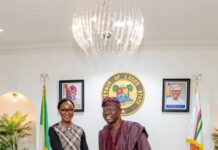By NIyi JACOBS
The recent debate over Nigeria’s Gross Domestic Product (GDP) numbers, particularly concerning discrepancies in data, has stirred significant discussion across economic and political circles. The differing views of Dr. Akinwunmi Adesina, President of the African Development Bank (AfDB), and Mr. Bayo Oanuga, spokesperson for President Bola Ahmed Tinubu, have highlighted the ongoing challenge in ensuring the credibility and timeliness of economic data in the country. While disagreements in a progressive society are natural, it becomes imperative that these differences are grounded in empirical data from credible sources, especially when the conversation revolves around national economic performance.
At the heart of this debate is the reliability of the National Bureau of Statistics (NBS), Nigeria’s primary institution for collecting and reporting macroeconomic data. In its role, the NBS is expected to provide the most credible and up-to-date economic statistics, including GDP. However, several issues have emerged, raising doubts about the accuracy and timeliness of the country’s economic data. The primary concern is not the lack of data, as Nigeria has a robust statistical framework, but rather the delays and inconsistencies that can occur in the dissemination of the data. While the NBS has made commendable strides in upgrading its surveys and adopting new analytical tools, there is still the pressing issue of speed and availability when it comes to publishing the results of key data points, such as GDP.
These delays have only added fuel to the fire in the ongoing controversy over Nigeria’s GDP numbers. Questions about the accuracy of the country’s GDP per capita figures have been raised, particularly with regard to historical data and the informal economy’s exclusion from official calculations. The informal sector is believed to contribute between 50% and 60% of economic activity in Nigeria, and its omission from GDP calculations raises concerns about the overall reliability of the country’s economic data. Dr. Adesina has pointed out that the failure to capture the informal economy in the GDP data presents a skewed picture of Nigeria’s economic landscape, potentially leading to misguided policy decisions that do not reflect the reality of the average Nigerian.
In reviewing the situation, BusinessNG analysts note that Nigerian policymakers need to prioritize the use of accurate, timely, and comprehensive data to guide national development. The absence of reliable GDP figures, coupled with issues like rising inflation, a high poverty rate, and infrastructure deficits, underscores the urgency for more accurate and inclusive data. The failure to account for the informal economy, which provides livelihoods for millions of Nigerians, can lead to a distorted view of economic growth, poverty levels, and wealth distribution.
The debates over Nigeria’s GDP numbers also reveal a deeper challenge facing the country’s policymakers: the need for transparency and accountability in the statistical process. The NBS, as the most credible source of national data, must take responsibility for clarifying the discrepancies in GDP figures, particularly regarding the informal economy and GDP per capita. A more consistent and transparent approach to data gathering and reporting would not only bolster the credibility of Nigeria’s GDP numbers but also ensure that policy decisions are based on the most accurate and comprehensive data available.
The ongoing controversy has also highlighted the need for Nigeria to reconsider its approach to GDP rebasing. The GDP rebasing process, which is intended to provide a more accurate reflection of the economy by incorporating new industries and sectors, has been long overdue. BusinessNG analysts estimate that Nigeria’s rebased GDP, if accurately calculated, could be as high as US$590 billion. However, despite this forecast, the NBS has yet to release the official rebased GDP figures, leaving policymakers and analysts to rely on outdated and incomplete data.
The failure to rebalance the GDP numbers not only leaves room for debate and confusion but also undermines efforts to achieve accurate assessments of Nigeria’s economic trajectory. Without a clear and up-to-date picture of the country’s GDP, it becomes difficult for policymakers to make informed decisions about fiscal policy, economic growth, and development priorities. As Proshare analysts note, the release of the rebased GDP figures is essential for providing clarity and transparency in Nigeria’s economic data, which, in turn, will help guide more effective policymaking.
The disagreement between Dr. Adesina and Mr. Oanuga also underscores the broader issue of data integrity in Nigeria. With key economic indicators such as GDP, inflation, and poverty rates in constant flux, it is essential for the NBS to ensure that its data is consistent, reliable, and reflective of the country’s economic realities. The absence of accurate data on key variables such as GDP per capita makes it difficult to assess the true state of the economy and the living standards of Nigerians.
Despite these challenges, analysts agree that the release of more comprehensive and accurate data could have a profound impact on Nigeria’s economic outlook. If the NBS were to release its rebased GDP figures and ensure that all relevant sectors, including the informal economy, are accounted for, it would provide a more accurate representation of the country’s economic performance. This, in turn, would allow policymakers to make more informed decisions that address the pressing challenges of high inflation, poverty, and income inequality.
Furthermore, a clearer understanding of Nigeria’s GDP would help investors, businesses, and international organizations make more informed decisions about where to allocate resources. As the country continues to grapple with economic challenges, having reliable data will be crucial for fostering investor confidence and ensuring that Nigeria can achieve sustainable economic growth in the years to come.
In addition to addressing GDP discrepancies, there are other macroeconomic indicators that must be carefully monitored to paint a more accurate picture of Nigeria’s economic reality. One of these is the Human Development Index (HDI), which measures overall human well-being and quality of life. The latest HDI data from the United Nations Development Programme (UNDP) and the NBS shows that Nigeria’s HDI remains low, at 0.521 at the state level, despite a 22% increase over the past two decades. The country’s HDI has been significantly impacted by inequality, with an estimated 32.7% loss in human development due to disparities in income distribution and access to basic services.
This highlights the need for Nigeria to focus on improving not only its GDP but also other indicators of human development. While GDP per capita is an important measure of economic output, it does not account for income inequality or the distribution of wealth. In a country like Nigeria, where vast disparities in wealth and opportunity persist, it is crucial to consider a more holistic approach to economic development that includes addressing inequality, improving education, healthcare, and infrastructure, and fostering inclusive growth.
The macroeconomic data also reveals that Nigeria’s economic growth has been uneven, with the country’s GDP expanding from US$4.2 billion in 1960 to over US$360 billion in 2023. However, despite this growth, Nigeria has struggled to translate this economic expansion into meaningful improvements in the standard of living for many of its citizens. The recent decline in Nigeria’s GDP in 2024, which has been attributed to various macroeconomic factors such as high inflation, insecurity, and governance challenges, further underscores the need for more targeted and inclusive economic policies.
The question remains: how can Nigeria address these challenges and achieve sustainable economic development? The answer lies in adopting a more comprehensive approach to economic policymaking, one that incorporates reliable and up-to-date data, addresses the needs of the informal economy, and prioritizes inclusive growth. As Proshare analysts argue, Nigeria must strengthen its statistical institutions, such as the NBS, to ensure that data collection and reporting are timely, accurate, and reflective of the full scope of the country’s economic activity.
Nigeria’s economic future hinges on the ability of its policymakers to make informed decisions based on accurate and comprehensive data. This includes not only GDP but also other indicators that provide a clearer understanding of the country’s economic and social realities. By addressing the discrepancies in GDP numbers, improving data integrity, and adopting a more inclusive approach to economic growth, Nigeria can build a more resilient and sustainable economy that benefits all its citizens.
In conclusion, while the discrepancies in Nigeria’s GDP data may seem like a technical issue, they have far-reaching implications for national policy and development. The NBS must take responsibility for ensuring that its data is accurate, timely, and reflective of the true state of the economy. With better data, Nigeria can pave the way for more effective policymaking, improved economic growth, and ultimately, a higher standard of living for all Nigerians. It is only through this commitment to data integrity and transparency that the country can hope to resolve its economic challenges and move towards a more prosperous future.














